
Moshe Jasper: Humans of BioSciences
Meet Moshe Jasper, Research Assistant in PEARG. Moshe shares what inspired him to become a scientist and what he wishes he had known when he was an undergraduate student.
What is it like to work in PEARG ?
The Pest & Environmental Adaptation Research Group undertakes research on adaptation of organisms (particularly invertebrates) to environmental stresses. As a Research Assistant I do a little bit of everything, but my main focuses are on developing and improving LAMP assays for Wolbachia and insecticide resistance, and assisting with population genetic analyses of species of interest within the group (such as the Mountain Pygmy-possum or sundry insects). A research highlight for me has been developing ways of measuring animal dispersal through the geographical networks of close kin uncoverable by modern genotyping methods.
LAMP (loop-mediated isothermal amplification) is a recently developed method for amplifying and detecting DNA. Unlike traditional PCR reactions that require thermocycling (moving back and forth between three temperatures), LAMP assays are set up in such a way that the whole reaction happens at one constant temperature. It achieves this by using six primers instead of the normal two, and a special polymerase that can ‘unzip’ DNA as it goes along. Together, the primers and polymerase form an amplification loop, which can keep taking more and more primers and start lots of different DNA replication processes at the same time in what becomes a rapidly building DNA snowball. Done properly, this can make for an extremely sensitive, extremely fast test for the presence of something in the DNA that we’re interested in (e.g. a particular gene or mutation) giving us a result as quickly as ten minutes, but in a way that is very portable and robust (you can take these with you on your field collection trips and get basic results same day). All in all, these tests can be really helpful to develop.
What do you love most about science and your job?
When I walk outside on a starry night, I feel a sense of curiosity and wonder for the world around me. What’s great about science is that it takes curiosity and wonder and builds upon it with hard work, careful thinking, and tenacious problem-solving. The small details I help to uncover as I pipette ethanol or analyse principal components in their own way connect and weave into that bigger picture.
The best thing about my job is the way that the group is so focused on the applications of science to agriculture, health and conservation, as well as in building partnerships with the government and the community. It is easy to see and appreciate the connections between the things we study day to day in the lab and some of their real-world impacts. Being surrounded by great people is also amazing. In the new socially-distanced era, having a supportive ‘lab family’ around you couldn’t be more important.
Recently I helped to organise a socially distanced games evening with the lab. We all jumped on Zoom together and screen-shared some of Jackbox Games’ best offerings – Quiplash and Trivia Murder Party – which are great as they are all about player interaction and work well remotely. Seeing each other in a non-work context really enhances togetherness, and brings in the distance just a little. I was well and truly outmatched by some of the wits and geniuses within the group, but a fun time was had by all, and we’re hoping to run a similar event again.
What do you enjoy doing in your free time?
I like taking in the air on a long walk, reading a good book (mostly biography or fantasy), and spending evenings in conversations with close friends. I also thoroughly enjoy playing the piano – but have increasingly abandoned the classical for long moody hours of letting improvisation take me wherever we want to go together. I play computer games, but never really moved on from that old classic Age of Empires II. COVID-19 has impacted the way I have been spending my time of course. As a Christian, this Easter was particularly hard, with my family interstate and no real ability to celebrate with close community – but my housemates and I still managed a lamb roast and some Easter-eggs, which was a plus.
What do you wish you’d known as an undergrad?
All kinds of people become scientists. Most of us feel at some point like we don’t belong. And that’s okay, seriously.
When I came to university, I had no idea whether pursuing science would work for me. Growing up homeschooled on a farm in the country, I’d never done a science prac in my life. My first chemistry experiment ended with a smashed flask and my ‘yield’ all floating down the sink. The simple fact of sitting in a lecture was completely foreign to me. So I took my classes and made friends and studied – but that was really it.
What made the difference was a conversation out of the blue with one of the lab demonstrators, who asked me if I had considered becoming a biologist – they thought I would be good at it. Their unexpected encouragement pushed me to consider science more seriously. In the journey that’s followed I’ve learned that there’s no one way to be a scientist, and often it’s the things that make you most feel like an outsider that end up being your biggest strengths.